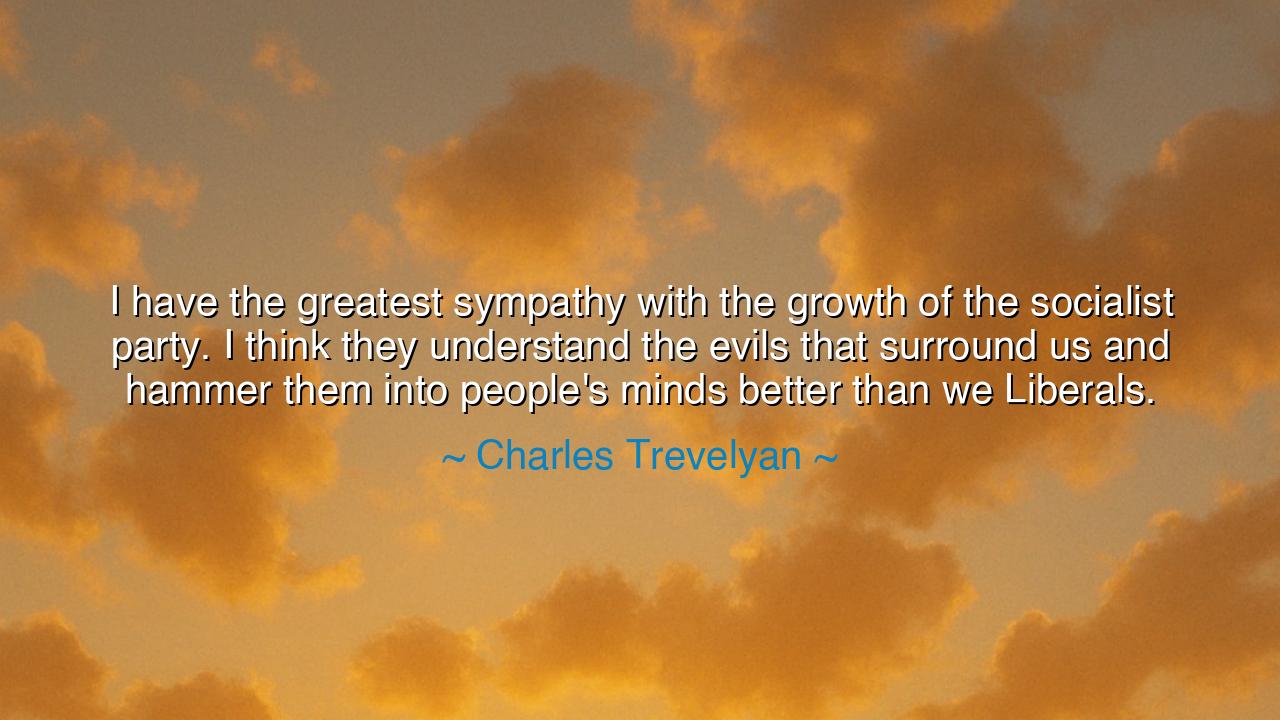
I have the greatest sympathy with the growth of the socialist
I have the greatest sympathy with the growth of the socialist party. I think they understand the evils that surround us and hammer them into people's minds better than we Liberals.






Hear, O children of the future, the words of Charles Trevelyan, a man of profound understanding: "I have the greatest sympathy with the growth of the socialist party. I think they understand the evils that surround us and hammer them into people's minds better than we Liberals." These words carry the weight of deep insight into the state of society, the ills that plague it, and the different ways in which political movements seek to address those very evils. Trevelyan’s sympathy for the growth of the socialist party speaks not just to his agreement with their views, but to his recognition that awareness of society’s problems is an essential first step in healing them.
In the ancient world, O children, philosophers and leaders often grappled with the question of how to address the evils that beset society. Plato, in his ideal vision of the just society, sought to understand the forces that corrupt and divide the people. Aristotle warned against the dangers of inequality and the concentration of power, for he understood that when a society is ruled by the few, the many suffer. The struggle for a just society is as old as human civilization itself, and each generation has tried to find ways to address the injustices that arise from greed, inequality, and corruption. Trevelyan’s words speak to this ancient battle, reminding us that political movements like socialism seek to not only understand these evils, but also to combat them in a way that the more moderate liberal approaches have not always managed to do.
Consider, O children, the example of Spartacus, the leader of the slave revolt in ancient Rome. His movement, though short-lived, was rooted in the understanding that the evils of slavery, of oppression, and of exploitation must be eradicated. Spartacus’ struggle was not just for his own freedom but for the freedom of all who suffered under the unjust system of Roman rule. His example shows us that when people are subjected to great injustice, there comes a moment when they must act, even against overwhelming odds. In this sense, socialist movements often arise out of a deep recognition of suffering and inequality, seeking to change the very structures of society that perpetuate these evils.
In the more recent past, consider the rise of Karl Marx and his call to revolution. Marx, like Spartacus, saw the evils of capitalism—the exploitation of the working class, the concentration of wealth in the hands of a few, and the brutal inequalities that defined much of the 19th century. His ideas, though controversial, brought to light the systematic injustices that many had long ignored or accepted as natural. Socialism, in this sense, became a movement not only for economic justice but for a new understanding of human dignity and solidarity. Trevelyan’s sympathy for the socialist cause is rooted in this recognition that the socialists have a unique ability to illuminate the evils that others are willing to tolerate or overlook.
Yet, O children, Trevelyan also draws a crucial distinction between socialism and liberalism—both movements that seek to improve society, but in different ways. Liberalism tends to advocate for gradual reform within the existing systems, believing that moderation and evolution can bring about change without upheaval. Socialism, on the other hand, calls for a more radical rethinking of the very foundations of society, often seeking to dismantle the structures that perpetuate inequality. Trevelyan acknowledges that while both movements may have good intentions, it is often the socialists who make the evils of the world more visible and force others to confront them, however uncomfortable that may be.
The lesson here, O children, is that in the face of inequality, injustice, and the evils of the world, we must not remain passive. Like Trevelyan, we must understand that there are many paths to addressing suffering and wrongdoing in society. Some will seek change through gradual reform, working within the system to make it more just, while others may call for a more radical transformation. Both approaches have their place, but neither can be effective unless we acknowledge the evils that exist and confront them. We must look deeply into the world around us, see the suffering of others, and find the strength to act—whether through quiet reform or bold revolution.
In your own lives, O children, take this wisdom to heart: no movement—be it liberal or socialist—is perfect, but they all come from a place of concern for the world. Sympathy for the suffering of others is the first step; but action is what transforms that sympathy into something meaningful. Whether through small acts of kindness, advocacy, or larger movements for justice, it is your responsibility to confront the evils in the world around you. Do not stand idle while the world suffers—use the knowledge you have gained to make it a better place, whether through small changes or grand reforms. In this, you will honor the legacies of those who have come before you and carve out a future where justice and equality prevail.






AAdministratorAdministrator
Welcome, honored guests. Please leave a comment, we will respond soon